- Home
- Milan Kundera
Life Is Elsewhere
Life Is Elsewhere Read online
FICTION
Tender and unsparing.... Life Is Elsewhere is a remarkable portrait of an artist as a young man.” —Newsweek
The author initially intended to call this novel The Lyrical Age. The lyrical age, according to Kundera, is youth, and this novel, above all, is an epic of adolescence; an ironic epic that tenderly erodes sacrosanct values: childhood, motherhood, revolution, and even poetry. Jaromil is in fact a poet. His mother made him a poet and accompanies him (figuratively) to his love bed and (literally) to his deathbed. A ridiculous and touching character, horrifying and totally innocent ("innocence with its bloody smile"!), Jaromil is at the same time a true poet. He's no creep, he's Rimbaud. Rimbaud entrapped by the communist revolution, entrapped in a somber farce.
"Along with Don Quixote and Madame Bovary, Life Is Elsewhere is perhaps the harshest work ever written against poetry. . . . Poetry as the last hiding place of God." —From the postface by Francois Ricard to the French edition
"Once again we observe the narrator's cool wit probe and peel away layers of self-delusion and masquerade. . . . Kundera offers a very special blend of sympathy and cynicism, irony and affability, that is unmatched in our literature." —Book Week
"A sly and merciless lampoon of revolutionary romanticism. . . . Kundera commits some of the funniest literary savaging since Evelyn Waugh polished off Dickens in A Handful of Dust." —Time "I will say no more about this lacerating book except to urge it upon all who care about literature in our difficult era." —Boston Globe
Perennial ISBN 0-06-099702-8
Life Is Elsewhere
Originally written in Czech under the title Zivot je jinde; translated into French under the title La vie est ailleurs. Copyright © 1973 by Milan Kundera. French translation copyright © 1973 by Editions Gallimard. An English translation first published in the United States by Alfred A. Knopf, 1976. French translation revised by Milan Kundera, copyright © 1985, 1987 by Editions Gallimard.
FIRST EDITION
Library of Congress Cataloging-in-Publication Data Kundera, Milan.
[Zivot je jinde. English]
Life is elsewhere/[Milan Kundera]; translated from the French by Aaron Asher. p. cm. Written first in Czech; published in French as La vie est ailleurs. ISBN 0-06-099702-8 I. Asher, Aaron.
Contents
Part 1 The Poet Is Born
Part 2 Xavier
Part 3 The Poet Masturbates
Part 4 The Poet Runs
Part 5 The Poet Is Jealous
Part 6 The Man in His Forties
Part 7 The Poet Dies
Authours note
PART ONE
The Poet Is Born
1
When the poet's mother wondered where the poet had been conceived, there were only three possibilities to consider: a park bench one night, the apartment of a friend of the poet's father one afternoon, a romantic spot outside Prague late one morning.
When the poet's father asked himself the same question, he concluded that the poet had been conceived in his friend's apartment, for on that day everything had gone wrong.
The poet's mother had refused to go to the friend's place, they had quarreled about it twice and reconciled twice, and while they were making love the door lock of the adjoining apartment rasped, the poet's mother took fright, they broke off, and then they resumed lovemaking and finished in a state of mutual tension to which his father attributed the poet's conception.
The poet's mother, on the other hand, never admitted that the poet had been conceived in a borrowed apartment (she was repelled by the bachelor's untidiness, by rumpled sheets and pajamas on a stranger's bed), and she also rejected the possibility that he had been conceived on a park bench, where she had let herself be persuaded to make love, reluctantly and without pleasure, thinking with disgust of the prostitutes who made love this way on such benches. So she became absolutely convinced that the poet had been conceived on a sunny summer morning in the shelter of a huge boulder that stood with sublime pathos among the other boulders in a small valley where the people of Prague liked to stroll on Sundays.
For several reasons this setting is an appropriate place for the poet's conception: in the late morning sun it is a setting of light rather than darkness, day rather than night; it is in the middle of open nature, thus a place from which to take wing; and finally, though not very far from the apartment buildings on the city's outskirts, it is a romantic landscape strewn with boulders looming out of wildly rough terrain. For the poet's mother all this seemed to express what she was experiencing at the time. Wasn't her great love for the poet's father a romantic rebellion against the dullness and regularity of her parents' life? Wasn't there a hidden likeness between the untamed landscape and the boldness she, the daughter of a rich merchant, showed in choosing a penniless engineer who had just finished his studies?
And so the poet's mother was living a great love, despite the disappointment that followed a few weeks after the beautiful morning at the foot of the boulder. When she disclosed to her lover, with joyous excitement, that the intimate indisposition that monthly disturbed her life was several days overdue, the engineer asserted with appalling indifference (but, it seems to me, a feigned and ill-at-ease indifference) that it was an insignificant disruption of her cycle, which would soon resume its benign rhythm. The poet's mother, perceiving that her lover refused to share her joyous hopes, was hurt, and she stopped talking to him until the day the doctor confirmed her pregnancy. The poet's father said that he knew a gynecologist who would discreetly relieve her of her worries, and she burst into tears.
The poignant end of rebellions! First she rebelled against her parents for the sake of the young engineer, and then she ran to her parents for help against him. Her parents didn't let her down: they spoke plainly to the engineer, who clearly understood that there was no way out, agreed to an ostentatious wedding, and readily accepted a sizable dowry that would enable him to establish his own construction business; then he packed his belongings into a couple of suitcases and moved into the villa his new wife had lived in with her parents from the day she was born.
The engineer's prompt capitulation, however, couldn't hide from the poet's mother that the adventure she had precipitated herself into with a heedlessness she found sublime was not the great shared love she believed she had a full right to. Her father was the owner of two flourishing shops in Prague, and the daughter's morality was that of balanced accounts; since she had invested everything in love (she had been ready to betray her own parents and their peaceful home), she wanted her partner to invest an equal amount of feeling in their joint account. Striving to redress the injustice, she wanted to withdraw from the joint account the affection she had deposited there, and after the wedding she presented a haughty and severe face to her husband.
The poet's mother's sister had recently left the family villa (she had married and rented an apartment in the center of Prague) and so the old retail merchant and his wife lived on the ground floor and the engineer and their daughter above them in the three rooms—two large and one smaller—furnished exactly the way they were twenty years before when the villa was built. Acquiring an entirely furnished home was a rather good deal for the engineer, because he really owned nothing but the contents of the aforementioned two suitcases; nonetheless, he suggested some small changes in the appearance of the rooms. But the poet's mother didn't allow the man who had wanted to put her under the knife of a gynecologist to dare disrupt the time-honored arrangement of rooms that harbored the spirit of her parents, twenty years of sweet routine, and mutual intimacy and safety.
This time, too, the young engineer capitulated without a struggle, permitting himself only a moderate protest, which I note: in the couple's bedroom there was a small t
abletop of heavy gray marble on which stood a statuette of a naked man; in his left hand the man was holding a lyre against his plump hip; his right arm was bent in a pathetic gesture as if the fingers had just struck the strings; the right leg was extended forward, the head slightly inclined, and the eyes turned toward the sky. Let me add that the man had an extremely beautiful face, that he had curly hair, and that the whiteness of the alabaster from which the statuette had been sculpted gave the figure something tenderly feminine or divinely virginal; it's not, moreover, by chance that I use the word "divinely": according to the inscription carved on the pedestal, the man with the lyre was the Greek god Apollo.
But the poet's mother could rarely look at the man with the lyre without being angered. Most of the time it was his rear end that faced the onlooker, and sometimes he served as a peg for the engineer's hat or a shoe was hung from his fine head or a smelly sock of the engineer's stretched over him, the latter a particularly odious defilement of the master of the Muses.
That the poet's mother was impatient with all this was not solely due to her meager sense of humor: she had in fact correctly guessed that with the buffoonery of putting a sock over Apollo's body her husband was letting her know what he politely hid from her with his silence: that he rejected her world and had only temporarily submitted to it.
Thus the alabaster object truly became an ancient god, that is, a supernatural being who intervenes in the human world, schemes, scrambles destinies, reveals mysteries. The newlywed wife regarded him as her ally, her dreamy femininity transforming him into a living creature whose eyes at times took on the colors of illusory irises and whose mouth seemed to draw breath. She fell in love with the naked little man, who was being humiliated for and because of her. Gazing at his lovely face she began to hope that the child growing in her belly would resemble this handsome foe of her husband's. She wanted the resemblance to be so strong that she would be able to imagine the child as this young man's rather than her husbands; she implored him to use his magical powers to rectify the fetus's features, to transform and transfigure them as the great Titian once did when he painted a masterpiece over a bungler's spoiled canvas.
Instinctively modeling herself on the Virgin Mary, who became a mother without the intervention of a human begetter and thus the ideal of maternal love without a father's troublemaking interference, she felt a provocative desire to name her child Apollo, a name that to her meant "he who has no human father." But she knew that her son would have a hard time with such a pretentious name and that it would make both him and her a laughingstock. So she looked for a Czech name that would be worthy of a young Greek god and came up with Jaromil (which means "he who loves spring" or "he who is beloved by spring"), and this choice was approved by everyone.
Moreover, it was spring and the lilacs were blooming when they drove her to the hospital; there, after some hours of suffering, the young poet slipped out of her onto the soiled sheet of the world.
2
Then they put the poet into a crib next to her bed and she heard the delightful cries; her aching body was filled with pride. Let's not begrudge her body that pride; until then it had not experienced it, even though it was well built: it did have a rather inexpressive rump and the legs were a bit too short, but the bosom, on the other hand, was unusually youthful, and beneath the fine hair (so fine it was difficult to set) a face that may not have been dazzling but had an unobtrusive charm.
Mama had always been more conscious of her unob-trusiveness than of her charm, all the more since she had lived since infancy with an older sister who was an outstanding dancer, was clothed by Prague's best couturier, and tennis racket in hand, moved easily in the world of elegant men, turning her back on the parental home. The flashy impetuosity of her sister confirmed Mama's sullen modesty, and in protest she learned to love the emotional gravity of books and music.
Admittedly, before she met the engineer she had gone out with a young medical student, the son of friends of her parents, but this relationship had been incapable of giving her body much self-confidence. The morning after being initiated by him into physical love in a summer house, she broke up with him with the melancholy certainty that neither her feelings nor her senses would ever experience a great love. And since she had just finished high school, she announced that she wanted to find the meaning of her life in work and had decided to register (despite her father's practical man's disapproval) in the faculty of arts and letters.
Her disappointed body had already spent four or five months on the wide bench of a university lecture hall when it encountered an arrogant young engineer in the street who called out to it and three dates later possessed it. And because this time the body was greatly (and to its great surprise) satisfied, the soul very quickly forgot its ambition of a university career and (as a reasonable soul always must) rushed to the body's aid: it gladly agreed with the engineer's ideas and went along with his cheerful heedlessness and charming irresponsibility. Even as she knew that they were foreign to her family, she wanted to identify herself with the engineer's qualities, because in contact with them her sadly modest body ceased to doubt and, to its own astonishment, began to enjoy itself.
Was she then happy at last? Not quite: she was torn between doubt and confidence; when she undressed before the mirror she looked at herself with his eyes and sometimes found herself arousing, sometimes vapid. She handed her body over to the mercy of another's eyes—and that caused her great uncertainty.
But even though she fluctuated between hope and doubt, she had been completely torn away from her premature resignation; her sister's tennis racket no longer demoralized her; her body finally lived as a body, and she understood that it was beautiful to live like that. She wanted this new life to be more than a deceptive promise, to be a lasting reality; she wanted the engineer to tear her away from the lecture-hall bench and from her parental home and turn a love adventure into a life adventure. That is why she welcomed her pregnancy with enthusiasm: she saw herself, the engineer, and her child as a trio rising to the stars and filling the universe.
I've already explained this in the previous chapter: Mama quickly realized that the man who sought a love adventure dreaded a life adventure and wanted no change at all like the image of a duo rising to the stars. But we also know that this time her self-confidence did not crumble under the pressure of the lover's coldness. Something very important had in fact changed. Mama's body, recently still at the mercy of the lover's eyes, entered a new phase of its history: ceasing to be a body for the eyes of others, it became a body for someone who could not yet see. Its outer surface was no longer so important; the body was touching another body by means of an internal membrane no one had ever seen. Thus the eyes of the external world could only perceive its inessential aspect, and even the engineer's opinions no longer meant anything to the body, for they could have no influence over its great destiny; the body had finally attained total independence and autonomy; the belly, which kept growing bigger and uglier, was for that body a steadily increasing supply of pride.
After the delivery, Mama's body entered a new phase. When she first felt the groping mouth of her son sucking at her breast, a sweet shiver radiated from her chest through her entire body; it was similar to her lover's caress, but it had something more: a great peaceful bliss, a great happy tranquillity. She had never felt this before; when her lover had kissed her breast, it had been a moment that should have made up for hours of doubt and mistrust; but now she knew that the mouth pressed against her breast brought proof of a continuous attachment of which she could be certain.
And then there was something else: when her lover touched her naked body, she always felt ashamed; their coming close to each other was always a surmounting of otherness, and the instant of embrace was intoxicating just because it was only an instant. Shame never dozed off, it exhilarated lovemaking, but at the same time it kept a close eye on the body, fearing that it might let itself go entirely. But now shame had disappeared; it had been done aw
ay with. These two bodies opened to each other entirely and had nothing to hide.
Never had she let herself go in this way with another body, and never had another body let itself go with her in this way. Her lover could play with her belly, but he had never lived there; he could touch her breast, but he had never drunk from it. Ah, breast-feeding! She lovingly watched the fishlike movements of the toothless mouth and imagined that, along with her milk, her son was drinking her thoughts, her fantasies, and her dreams.
It was an Edenic state: the body could be fully body and had no need to hide itself with a fig leaf; they were plunged into the limitless space of a calm time; they lived together like Adam and Eve before they bit into the apple of the tree of knowledge; they lived in their bodies beyond good and evil; and not only that: in paradise there is no distinction between beauty and ugliness, so that all the things the body is made of were neither ugly nor beautiful but only delightful; even though toothless, the gums were delightful, the breast was delightful, the navel was delightful, the little bottom was delightful, the intestines—whose performance was closely overseen— were delightful, the standing hairs on the grotesque skull were delightful. She watched oer her son's burps, pees, and poops not only with concern for the child's health; no, she watched over all the small body's activities with passion.
This was an entirely new thing because since childhood Mama had felt an extreme repugnance for physi-cality, including her own; she thought it degrading to sit on the toilet (she always made sure that no one saw her going into the bathroom), and there were even times when she had been ashamed to eat in front of people because chewing and swallowing seemed repugnant to her. Now her son's physicality, amazingly elevated above all ugliness, purified and justified her own body. The droplet of milk that sometimes remained on the wrinkled skin of her nipple seemed to her as poetic as a dewdrop; she would often press one of her breasts lightly to see the magical drop appear; she caught it with her index finger and tasted it; she told herself that she wanted to know the flavor of the beverage with which she nourished her son, but it was rather that she wanted to know the taste of her own body; and since her milk seemed delectable to her, its flavor reconciled her to all her other juices and secretions; she began to find herself delectable, her body seemed as pleasant, natural, and good to her as all natural things, as a tree, a bush, as water.

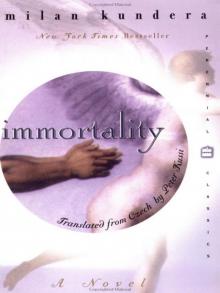 Immortality
Immortality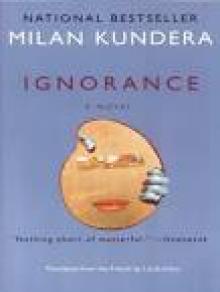 Dr. Havel After Twenty Years
Dr. Havel After Twenty Years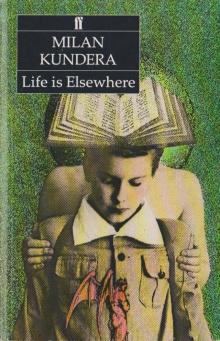 Life Is Elsewhere
Life Is Elsewhere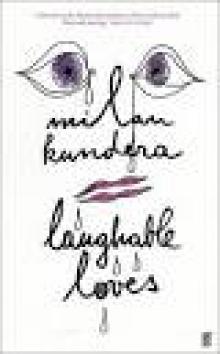 Laughable Loves
Laughable Loves Symposium
Symposium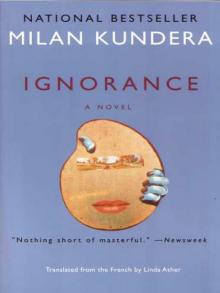 Ignorance
Ignorance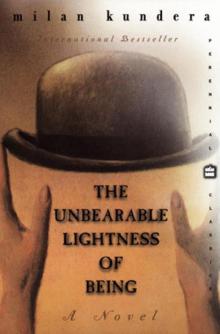 The Unbearable Lightness of Being
The Unbearable Lightness of Being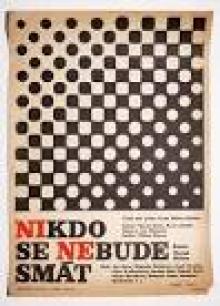 Nobody Will Laugh
Nobody Will Laugh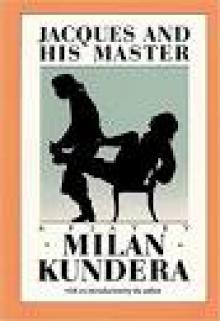 Jacques and His Master: An Homage to Diderot in Three Acts
Jacques and His Master: An Homage to Diderot in Three Acts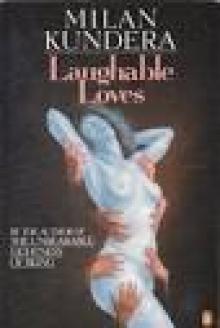 The Golden Apple of Eternal Desire
The Golden Apple of Eternal Desire Eduard & God
Eduard & God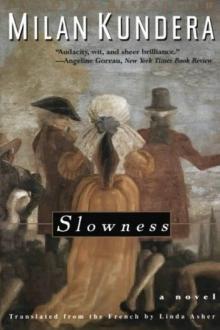 Slowness
Slowness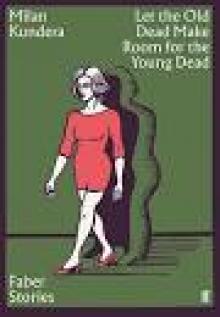 Let the Old Dead Make Room for the New Dead
Let the Old Dead Make Room for the New Dead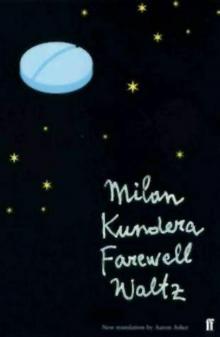 Farewell Waltz
Farewell Waltz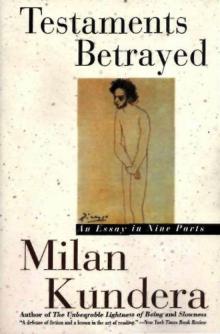 Testaments Betrayed: An Essay in Nine Parts
Testaments Betrayed: An Essay in Nine Parts